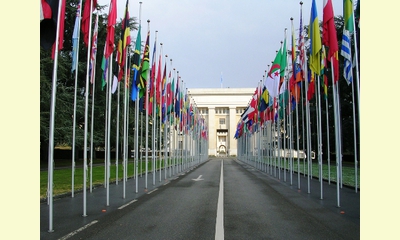|
|
Protection of human rights at heart of United Nations, says UN Geneva on 25th year
un articulo por Women News Network (reprinted by permission and abridged))
Noting that more and more people around the world
are taking to the streets to lay claim to their
rights, United Nations officials opened the latest
session of the Human Rights Council in Geneva
today with calls for the protection of members of
civil society who pursue justice in their
countries.

Flags line the street at the United Nations Human Rights Council in Geneva, Switzerland where the 25th session has just opened on Monday March 3, 2014. Image: Lili Vanili/Flickr
click on photo to enlarge
“Streets, airwaves, entire countries are buzzing
with demands for economic, social and political
justice,” UN High Commissioner for Human Rights
Navi Pillay said, as she opened the high-level
segment of the 25th session of the Council, the
Organization’s major human rights organ.
The session, which runs through 28 March, will
include presentations by the independent
commissions of inquiry on the Democratic People’s
Republic of Korea and on Syria, as well as
discussions on human rights mainstreaming, the
death penalty and genocide as well as the
promotion and protection of civil society
activities.
The 47-member body will also review the rights
records of members and hold events addressing the
prevention of large-scale abuses and on combating
sexual violence in the Democratic Republic of the
Congo, along with the annual full-day meeting on
the rights of the child and the annual debate on
the rights of persons with disabilities.
Setting out this agenda and acknowledging the hard
work that lay ahead in ensuring that all people
enjoyed equal rights, Ms. Pillay emphasized the
important role of civil society in those efforts.
“We need to work together to ensure that the
space, voice and knowledge of civil society is
nurtured in all our countries,” she stressed.
Recalling reports of what she labelled
“intolerable” reprisals against people who
cooperate with the UN’s human rights activities,
she called for more action to protect them. “The
UN itself is required to protect and support those
who contribute to its work, often at great
personal risk,” she said.
Secretary-General Ban Ki-moon, also present at the
opening today, added that, “No one should have to
risk their life for standing up and speaking out on
violations of human rights and international
humanitarian law.”
Mr. Ban said that civil society was the
representative of “We the Peoples,” as cited in the
opening of the UN Charter, and that it must be able
to carry out its vital work, “free of reprisals and
intimidation.”
In that context, the Secretary-General highlighted
the “Rights Up Front” action plan that he launched
last year to ensure that human rights
considerations were the top priority in all UN
activities.
“This initiative seeks to ensure that the United
Nations system leverages the full breadth of its
mandates to protect people at risk,” he said.
In their opening statements, Ms. Pillay and Mr.
Ban, along with General Assembly President John
Ashe, reported progress in legal tools and
awareness of human rights, as well as great
obstacles in ensuring that everyone enjoyed those
rights.
They regretted the continuation of intolerable
abuses and impunity for perpetrators in conflicts
from Syria to South Sudan and the Central African
Republic. Those tragedies, Mr. Ban said, “are sad
testaments to what can happen when perpetrators
feel free to abuse without consequences” . . .
[Thank you to Janet Hudgins, the CPNN reporter for
this article]
|








|
DISCUSSION
Pregunta(s) relacionada(s) al artículo :
What is the state of human rights in the world today?,
* * * * *
Comentario más reciente:
:
Each year we get overviews of the state of human rights in the world from Amnesty International and Human Rights Watch.

|
|









